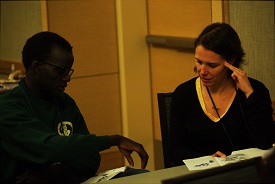
We recommend keeping these maps open on your device (or printed and at hand) while reviewing the Announcements and FAQ below:
| Files available for download » | |
Conference Announcements |
| 2. Checking in at the Conference The conference occurs entirely in Davidson Hall. The Pre-Conference check-in period on Wednesday, July 23 is from 8:15 a.m. until 9:00 a.m. in room DA 109, where you will receive your conference materials upon providing your name. If you are not able to attend the check-in area before 9:00 a.m. on July 24, you can proceed to the Opening Ceremony and Keynote, which will be in room DA 103. Then, during the first break, you can obtain your materials from the FCT Help Area in DA 109. All registration fees should be received by us prior to the conference. Anyone attempting to pay on-site will need special permission in advance. A signed purchase order from qualifying U.S. institutions (e.g. accredited schools, military or government offices, etc.) is an acceptable substitute for pre-payment, as long as we receive the signed P.O. before the conference. If you are lost on campus, remember that Davidson Hall has its own address that you can input into GPS: 2010 S. First Street Walk You might find the downloadable maps at the top of this page useful. You can also call one of our office numbers: +1 707 878 9100 +1 800 833 8345 A complimentary catered lunch will be served. 7. Coffee & Tea Coffee and tea are not provided by the conference. A Starbucks is found in the Swain Student Activities Center (building number 0016), a 200-yard eastward walk from Davidson Hall. This will be open weekdays until 3:00 p.m. |
Frequently Asked Questions |
|
1. What airport should I fly into? What are my options for ground travel? Where should I park? Please review our Travel & Lodging Page.2. What should I wear? While the venue is air-conditioned, Louisville will be hot and humid. We advise dressing in comfortable, removable layers with comfortable waking shoes. There is no need for formal clothing.
4. How do the Concurrent Sessions work? All Concurrent Sessions will be held on Saturday, July 26, and you do not need to register for these in advance. For each Concurrent time slot, there will be several sessions to choose from. Concurrent Session descriptions are available here , and will also be available in the printed conference program that you will receive at check-in. Reviewing these descriptions enables you to attend whichever Concurrent Sessions are most relevant to you.
5. How do the Roundtable Discussions work? Roundtable topics are clustered into pairs or groups three. Roundtable Presenters will take their respective turns conducting 10-15 minute presentations, and after all presentations are finished, the discussion will open into a Socratic dialogue among everyone in the circle. All Roundtable Discussions take place concurrently for one hour. Participants are free to attend whichever ones they wish, and can move between discussions after initial presentations are finished. You can read Roundtable Discussion descriptions here , which will also appear i n the printed conference program that you will receive at check-in. All Roundtable Discussions take place concurrently for one hour. Participants are free to attend whichever ones they wish, and can move between discussions after initial presentations are finished. You can read Roundtable Discussion descriptions here , which will also appear i n the printed conference program that you will receive at check-in.
6. What is the closing session? This is a time for all registrants to come together on the last day, to process what you have learned at the conference, and to think about next steps for moving forward. This session will be led by Drs. Linda Elder and Gerald Nosich with input from our Visiting Scholars as well.
To communicate with us about our professional development programs, please email us at cct@criticalthinking.org . 8. What is your policy on canceling my registration? Please see the policy description on this page .
|
| |
| | |